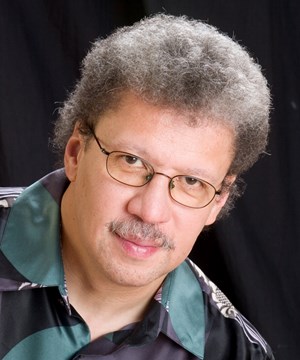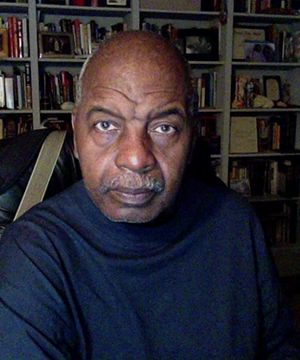About the Composer & Librettist
Anthony Davis is an internationally recognized composer of operatic, symphonic, choral, and chamber works, and a winner of the Pulitzer Prize for his opera The Central Park Five. He is also known for his virtuoso performances both as a solo pianist and as the leader of the ensemble Episteme, a unique ensemble of musicians who are disciplined interpreters as well as provocative improvisers. In April 1993, Davis made his Broadway debut, composing the music for Tony Kushner’s Pulitzer Prize-winning play Angels in America: Millennium Approaches, directed by George C. Wolfe. His music is also heard in Kushner’s companion piece, Perestroika, which opened on Broadway in November 1993.
As a composer, Davis is best known for his operas. X, The Life and Times of Malcolm X, which played to sold-out houses at its premiere at the New York City Opera in 1986, was the first of a new American genre: opera on a contemporary political subject. The recording of X was released on the Gramavision label in August 1992 and received a Grammy Nomination for "Best Contemporary Classical Composition" in February 1993. "[X] has brought new life to America's conservative operatic scene," enthused Andrew Porter in The New Yorker, "it is not just a stirring and well fashioned opera -- that already is much -- but one whose music adds a new, individual voice to those previously heard in our opera houses." Davis's second opera, Under the Double Moon, a science fiction opera with an original libretto by Deborah Atherton, premiered at the Opera Theatre of St. Louis in June 1989. His third opera, Tania, with a libretto by Michael-John LaChiusa and based on the abduction of Patricia Hearst, premiered at the American Music Theater Festival in June 1992. A recording of Tania was released in 2001 on Koch, and in November 2003, Musikwerkstaat Wien presented its European premiere. A fourth opera, Amistad, about a shipboard uprising by slaves and their subsequent trial, premiered at the Lyric Opera of Chicago in November 1997. Set to a libretto by poet Thulani Davis, the librettist of X, Amistad was staged by George C. Wolfe.
Reacting to two of Davis's orchestral works, Maps (Violin Concerto) and Notes from the Underground, Michael Walsh said in Time Magazine: "Imagine Ellington's lush, massed sonorities propelled by Bartók's vigorous whiplash rhythms and overlaid with the seductive percussive haze of the Balinese gamelan orchestra, and you will have an idea of what both the Concerto and Notes from the Underground sound like." Davis's works also include the Violin Sonata, commissioned by Carnegie Hall for its Centennial; Jacob's Ladder, a tribute to Davis's mentor Jacob Druckman commissioned by the Kansas City Symphony; Esu Variations, a concert opener for the Atlanta Symphony; Happy Valley Blues, a work for the String Trio of New York with Davis on piano; and "Pale Grass and Blue, Then Red," a dance work choreographed by Ralph Lemon for the Limon Dance Company. His orchestral works have been performed by the New York Philharmonic, San Francisco Symphony, Pittsburgh Symphony, Atlanta Symphony, Orchestra of St. Luke's, Brooklyn Philharmonic, Kansas City Symphony, Beethoven Halle Orchestra of Bonn, and the American Composers Orchestra. The Chicago Symphony Orchestra performed Davis's opera X, The Life and Times of Malcolm X in concert in November 1992. The Pittsburgh Symphony commissioned a concert-opener from Davis entitled Tales (Tails) of the Signifying Monkey. In the 2003-2004 season Davis served as Artistic Advisor of the American Composers Orchestra's Improvise! festival and conference which featured a performance of Wayang V with Davis as piano soloist. Oakland Opera Theatre presented X, The Life and Times of Malcolm X in 2006, and Spoleto Festival USA produced Amistad in its revised and reduced form in 2008. The La Jolla Sympony premiered Amistad Symphony in 2009.
Born in Paterson, New Jersey, on 20 February 1951, Davis studied at Wesleyan and Yale universities. He was Yale's first Lustman Fellow, teaching composition and Afro-American studies. In 1987 Davis was appointed Senior Fellow with the Society for the Humanities at Cornell University, and in 1990 he returned to Yale University as Visiting Professor of Music. He became Professor of Music in Afro-American Studies at Harvard University in the fall of 1992, and assumed a full-time professorship at the University of California at San Diego in January 1998. Recordings of Davis's music may be heard on the Rykodisc (Gramavision), Koch and Music and Arts labels. His music is published by G. Schirmer, Inc.
Biography and photo courtesy of wisemusicclassical.com.
Richard Wesley was born in Newark, New Jersey and graduated from Howard University. He studied Playwriting under the tutelage of Owen Dodson and Ted Shine. A member of the New Lafayette Theater from 1970 through 1973, he served as Managing Editor of its Black Theater magazine.
He was presented with a Drama Desk Award for his 1971 stage play, The Black Terror. His 1978 play, The Mighty Gents, appeared on Broadway. His 1989 play, The Talented Tenth, brought him his fifth Audelco Award for outstanding play. In 2013, he received the prestigious Otto Award for Writing for Political Theater.
Later that same year Mr. Wesley was commissioned by the Trilogy Opera of Newark, New Jersey to write the libretto for an opera, Papa Doc, with music composed by Dorothy Rudd Moore, and adapted from an essay by Edwidge Danticat. His second libretto for Trilogy, Five, an operatic interpretation of the events surrounding the wrongful conviction and imprisonment for rape and attempted murder, of five young Harlem teens, known as the “Central Park Five,” was completed in 2015 and received its world premiere in October, 2016. The composer is the highly regarded Anthony Davis. A third libretto was completed in 2016, titled, Kenyatta, with music composed by Trent Johnson.
Mr. Wesley was brought back to Trilogy in 2017 to pen the libretto for the opera, Scott, Garner, Gray, Says James Baldwin with composer Dwayne Fulton, and Wed and Booker T, in 2018, with composer Julius Williams.
The acclaimed Crossroads Theater of New Brunswick, NJ, premiered Mr. Wesley's political drama, Autumn, in 2015. The play was later produced by the Billie Holiday Theater, where it received its New York premiere just prior to the 2016 Presidential election. Autumn brought Mr. Wesley his sixth Audelco Award in 2017.
In 2019, a revamped and rewritten version, renamed The Central Park Five, was premiered by the Long Beach Opera Company at the Fox Grand Theatre in Sab Pedro, California. The opera would receive the 2020 Pulitzer Prize for Music.
Mr. Wesley has shared two NAACP Image “Best Picture” Awards for the motion pictures, Uptown Saturday Night and Let's Do It Again, both of which starred Sidney Poitier and Bill Cosby. Among his other motion pictures: Native Son (1984) and Fast Forward (1985).
In television, he has authored the scripts for the movies, The House of Dies Drear (PBS, 1984), Murder Without Motive (NBC, 1992), Mandela and De Klerk (Showtime, 1997), and co-wrote the scripts for Bojangles (Showtime, 2002) and Deacons for Defense (Showtime, 2003). He has also written episodes for the series Fallen Angels (Showtime, 1996), One Hundred Center Street (A&E Cable Networks, 2000 and 2001) and Miracle's Boys (2005). Deacons for Defense was the recipient of the 2004 Black Reels Award for Best Screenplay.
Mr. Wesley is currently an Associate Professor in the Tisch School of the Arts at New York University, and was for eight years the Chair of the Rita and Burton Goldberg Department of Dramatic Writing there. He is a former Vice President of the Writers Guild of America, East, Inc., and currently sits on the National Film Preservation Board of the Library of Congress in Washington, DC, the Selection Committee for the Black Film Festival of the Newark Museum and the Board of Directors, Newark Performing Arts Corporation at Symphony Hall.
He is married to the novelist, Valerie Wilson Wesley.
Photo and biography courtesy of richardwesley.net.


